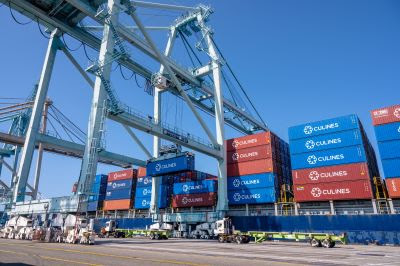Imports down amid full warehouses, Lunar New Year factory closures
Cargo moving through the Port of Long Beach slowed in February due to full warehouses, reduced consumer spending, and the closure of east Asian factories during the Lunar New Year holiday.
Dockworkers and terminal operators moved 543,675 twenty-foot equivalent units (TEUs) last month, down 31.7% from February 2022, which was the Port’s busiest February on record. Imports declined 34.7% to 254,970 TEUs and exports decreased 5.9% to 110,919 TEUs. Empty containers moving through the Port were down 38.3% to 177,787 TEUs.
“Trade continues to normalize following the record-breaking cargo numbers we saw at the start of last year,” said Port of Long Beach Executive Director Mario Cordero. “We are investing in infrastructure projects that will keep us competitive as we collaborate with industry stakeholders to focus on trade volume.”
“Our facilities, longshore labor, marine terminal operators, and all of our industry partners make this the premier gateway for trans-Pacific goods movement,” said Long Beach Harbor Commission President Sharon L. Weissman. “This traditionally slow time of year provides an opportunity to focus on long-term projects and the operational excellence that makes us the Port of Choice.”
Trade typically slows in February as east Asian factories close for up to two weeks as workers celebrate Lunar New Year. Economists say the year started stronger than anticipated, but shifts in trade routes and increased prices driven by inflation contributed to a decline in shipments as retailers continued to clear warehouses.
For complete cargo numbers, visit polb.com/statistics.











